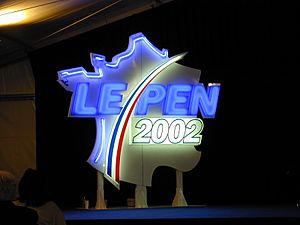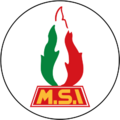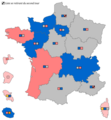National Rally facts for kids
Quick facts for kids <div style="padding-top:0.3em; padding-bottom:0.3em; border-top:2px solid Lua error in Module:European_and_national_party_data/config at line 227: attempt to index field 'data' (a nil value).; border-bottom:2px solid Lua error in Module:European_and_national_party_data/config at line 227: attempt to index field 'data' (a nil value).; line-height: 1;">
National Rally
Rassemblement national
|
|
|---|---|
 |
|
| Abbreviation | RN |
| President | Jordan Bardella |
| Vice Presidents |
|
| Parliamentary party leader | Marine Le Pen (National Assembly) |
| Founders | Jean-Marie Le Pen, Pierre Bousquet |
| Founded | 5 October 1972 (FN); 2018 (RN) |
| Preceded by | Ordre Nouveau |
| Headquarters | 114 bis rue Michel-Ange 75016 Paris |
| Youth wing | Rassemblement national de la jeunesse |
| Security wing | Department for Protection and Security |
| Membership (2025) | 120,000 (claimed) |
| Ideology |
|
| Political position | Far-right |
| National affiliation | Rassemblement bleu Marine (2012–2017) |
| European affiliation | Patriots.eu |
| European Parliament group | Patriots for Europe (since 2024) |
| Colours | Navy blue |
| National Assembly | Lua error in Module:European_and_national_party_data/config at line 227: attempt to index field 'data' (a nil value). |
| Senate | Lua error in Module:European_and_national_party_data/config at line 227: attempt to index field 'data' (a nil value). |
| European Parliament | Lua error in Module:European_and_national_party_data/config at line 227: attempt to index field 'data' (a nil value). |
| Presidencies of Regional Councils |
0 / 17
|
| Regional Councillors |
242 / 1,758
|
| Presidencies of Departmental Councils |
0 / 101
|
| Departmental Councillors |
26 / 4,108
|
| Website | |
| Lua error in Module:European_and_national_party_data/config at line 227: attempt to index field 'data' (a nil value). | |
|
^ A: The RN is considered part of the radical right, a subset of the far-right which does not oppose democracy. |
|
The National Rally (in French, Rassemblement national or RN) is a political party in France. From 1972 to 2018, it was called the National Front (Front national or FN). The party is known for its national conservative and right-wing populist ideas. Populist leaders often say they represent ordinary people against powerful groups.
The party wants to reduce immigration to protect French identity. It also supports a strong "law and order" approach to crime. In foreign policy, it wants France to be more independent and to leave NATO's main military command. The party also wants to change the European Union (EU) but no longer wants to leave it entirely.
The National Rally was founded in 1972 by Jean-Marie Le Pen. His daughter, Marine Le Pen, took over as leader in 2011. She tried to soften the party's image to attract more voters. In 2022, Jordan Bardella became the new president of the party.
Over the years, the party has become more popular. In the 2022 parliamentary elections, it won 89 seats in the National Assembly, a huge increase from the 8 seats it had before. This made it a major opposition party. In the 2024 elections, the party won the most votes in the first round and ended up with 142 seats, making it the third-largest group in the assembly.
Contents
History of the Party
How the Party Began (1972–1981)
The National Front was created on October 5, 1972. It was formed by a group called Ordre Nouveau (New Order) to bring together different far-right movements in France. They chose Jean-Marie Le Pen as their first leader because he was a well-known figure. The party's logo, a flame, was inspired by a similar party in Italy.
In its early years, the party was not very successful. In the 1973 elections, it received less than 1% of the vote. In the 1974 presidential election, Jean-Marie Le Pen won only 0.8% of the vote. The party struggled to compete with other political groups.
The 1981 election of François Mitterrand, a Socialist, as president changed French politics. This shift led some voters who were against socialism to look for new political options, which helped the National Front.
Gaining Popularity (1982–1988)
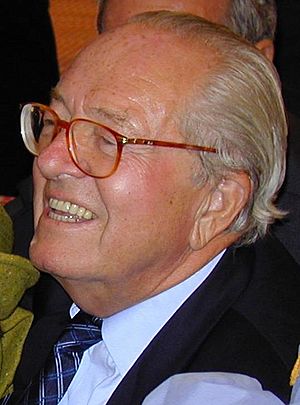
In the mid-1980s, the National Front started to gain more support. A key moment was the 1983 election in the town of Dreux. The FN won 17% of the vote, and the main center-right parties agreed to form an alliance with them. This was a big turning point for the party.
In 1984, the party got more media attention. Le Pen appeared on a popular TV show, which he later said "changed everything." In the 1984 European elections, the FN surprised many by winning 11% of the vote and 10 seats.
For the 1986 legislative elections, France used a new voting system called proportional representation. This system helped the FN win 35 seats in the National Assembly with 9.8% of the vote. This gave the party a new level of legitimacy, even though it couldn't pass its own laws.
A Powerful Force (1988–2002)
In the 1988 presidential election, Jean-Marie Le Pen received 14.4% of the vote, a new record for the party. However, the voting system for legislative elections was changed back, and the FN won only one seat that year.
Throughout the 1990s, the party's support continued to grow. It focused on issues like immigration and national identity. In the 1995 local elections, the FN won control of three cities: Toulon, Marignane, and Orange. This was a major success for the party.
In 1999, the party split. A top member, Bruno Mégret, left to form his own party. This split weakened the National Front for a while.
The 2002 Presidential Election Shock
The 2002 presidential election was a huge shock for France. Jean-Marie Le Pen beat the Socialist candidate and made it to the second round against President Jacques Chirac. This was the first time a far-right candidate had ever reached the final round.
Many people were unhappy with this result. Huge protests took place across France against Le Pen. In the final vote, Chirac won with over 82% of the vote, as people from all other parties voted for him to block Le Pen.
Marine Le Pen's Leadership
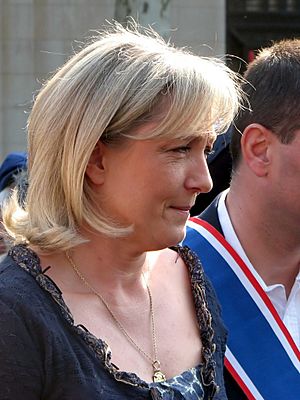
A New Image for the Party (2011–2017)
In 2011, Jean-Marie Le Pen's daughter, Marine Le Pen, became the new leader. She started a process called "de-demonisation," which means she tried to make the party seem less extreme. She wanted to soften its image to appeal to more voters. She even expelled her own father from the party in 2015 for making controversial statements.
Under her leadership, the party's popularity grew. In the 2012 presidential election, she won 17.9% of the vote, the best result for the party at the time. In the 2014 European elections, the National Front came in first place in France, a historic victory.
In the 2017 presidential election, Marine Le Pen again reached the second round. She lost to Emmanuel Macron, but she won 33.9% of the vote, which was much more than her father received in 2002.
Becoming the National Rally (2018)
In 2018, Marine Le Pen proposed changing the party's name from National Front to National Rally (Rassemblement national). She said the new name would better reflect the party's goal of uniting the French people. The party members voted to approve the name change.
Recent Elections (2022–2024)
In the 2022 presidential election, Le Pen once again faced Macron in the final round. She lost again but improved her score, winning 41.45% of the vote.
A few months later, in the 2022 legislative elections, the National Rally had a massive success. The party won 89 seats in the National Assembly. This was a huge increase from the 8 seats they had before. This result made them the largest opposition group in parliament.
Jordan Bardella's Leadership
Jordan Bardella was elected president of the National Rally on November 5, 2022. Marine Le Pen stepped down as president but remained the leader of the party's group in the National Assembly.
In the 2024 European elections, the National Rally, led by Bardella, won with 31.4% of the vote. This big win caused President Macron to call a surprise legislative election. In these elections, the National Rally won the most votes in the first round. In the end, they won 142 seats, making them the third-largest party in the National Assembly.
What the Party Believes In
Society and Law
The National Rally has a strong focus on "law and order." It supports tougher punishments for criminals. For a long time, the party wanted to bring back the death penalty. More recently, Marine Le Pen has suggested life in prison without parole for the most serious crimes.
The party is also known for its views on immigration. It wants to greatly reduce the number of immigrants coming to France. It also wants to make it harder for foreigners to become French citizens. The party connects immigration with threats to French culture and security.
Economy
The party's economic ideas have changed over time. In the 1980s, it supported free markets and lower taxes. Today, it supports protectionism, which means protecting French businesses from foreign competition. This is part of what it calls "economic patriotism."
The party also supports keeping public services and has opposed tax increases on fuel and changes to the retirement age.
Foreign Policy
The National Rally has a critical view of the European Union. For years, it wanted France to leave the EU and the euro currency. In 2019, the party changed its position. Now, it wants to reform the EU from the inside rather than leave it.
The party is also critical of NATO. It wants France to leave NATO's integrated military command, which would give France more control over its own army.
Election Results
The National Rally has seen its support grow over the decades. It started as a small party but is now one of the most powerful in France.
- Presidential Elections: The party has reached the final round three times: in 2002, 2017, and 2022.
- Legislative Elections: The party's biggest success was in 2022, when it won 89 seats. It increased this to 142 seats in 2024.
- European Elections: The party came in first place in France in the 2014, 2019, and 2024 European Parliament elections.
Images for kids
-
Bruno Mégret and his followers broke away from the FN to form a new party in 1999.
See also
 In Spanish: Agrupación Nacional (Francia) para niños
In Spanish: Agrupación Nacional (Francia) para niños
 | Leon Lynch |
 | Milton P. Webster |
 | Ferdinand Smith |


